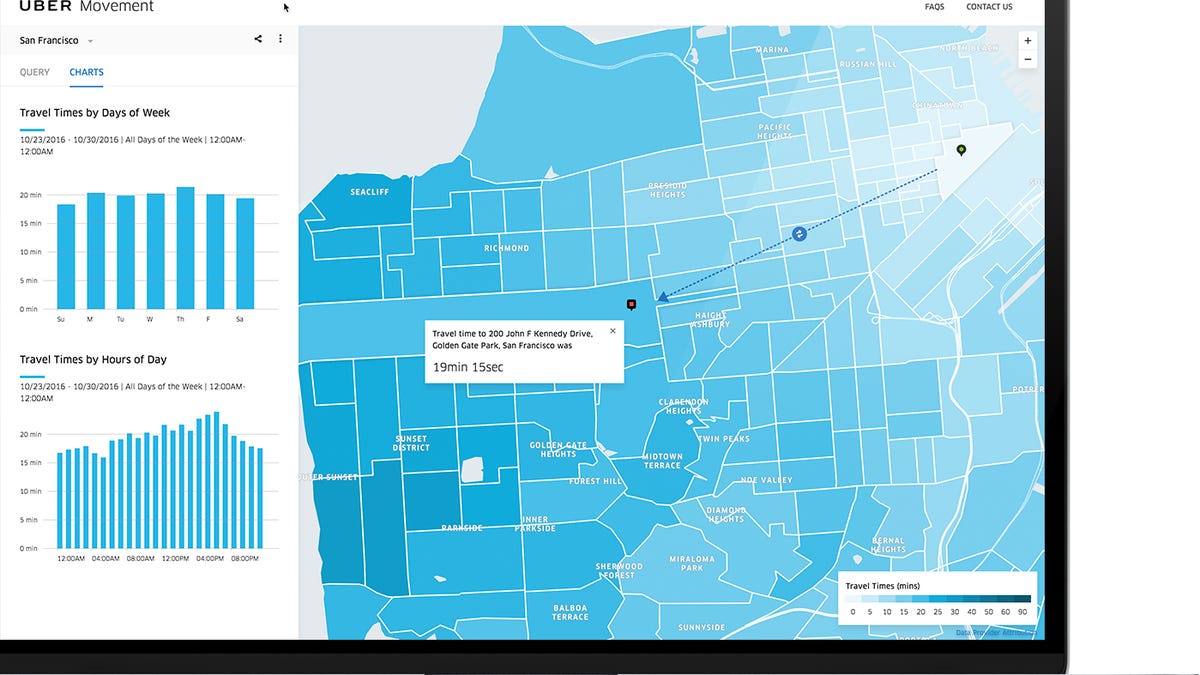Uber to let loose loads of ride data
The ride-hailing company refused to release transit data... until now. With "Movement," Uber will publish anonymized and aggregated data for cities worldwide.

Uber's new "Movement" website is meant to help urban planners better understand traffic patterns.
Uber is known as a secretive company that isn't keen on divulging its data. It's had public spats with lawmakers from New York to Seattle to ensure data on its rides isn't released to the public.
But now the ride-hailing company appears to be changing course.
Uber announced Sunday that it's planning to share the ride and traffic data it's collected from billions of rides. The company is releasing the data to "help urban planners make informed decisions about our cities," it wrote in a blog post.
Uber is the world's highest valued venture-backed company. Analysts say it could be worth as much as $68 billion. Its premise is simple: As a ride-hailing service, it pairs drivers with passengers via a phone app. Since its founding in 2009, Uber has grown to become one of the biggest ride-hailing services on the planet, with more than 40 million monthly active riders and operations in more than 450 cities in more than 70 countries.
While handing a trove of ride data to cities would likely be helpful to urban planners, it could also aid Uber's aims to enter more cities and thus gain more passengers. The company still isn't in South Dakota, Wyoming or upstate New York. By showing its data to regulators, Uber could demonstrate that ride-hailing might help traffic and mobility.
"Uber trips occur all over cities, so by analyzing a lot of trips over time, we can reliably estimate how long it takes to get from one area to another," the company wrote in the blog post. "Since Uber is available 24/7, we can compare travel conditions across different times of day, days of the week, or months of the year -- and how travel times are impacted by big events, road closures or other things."
Releasing this information could also help Uber deflect requests for more specific data from city regulators, like those in New York, Seattle, Boston, Charleston and Houston. Uber faced off with New York just last week over the city's requests for the address and drop-off times of each ride. All taxis already provide this information to the city, but Uber called it an invasion of privacy.
Uber will be releasing its data via a website named "Movement," which is slated to be live in the coming weeks. Initially, Movement will be only available to urban planners, city officials and research organizations, but Uber said it will eventually make the site open to the public.
The company will first focus on data from Manila, Melbourne and Washington DC, and then add more cities. This data will be anonymized and aggregated and is meant to give users an idea of how long certain routes take during different times of the day and days of the week.
"City planners face a myriad of challenges," Uber wrote in the blog post. "We hope to help tackle more of them over time."
Update, 3:06 p.m.: Adds background information on New York's request for Uber's data.
CES 2017, what you can't miss: Not in Vegas? CNET shows you all the stuff you've just gotta see right here.
CNET Magazine: Check out a sampling of the stories you'll find in CNET's newsstand edition, right here.

